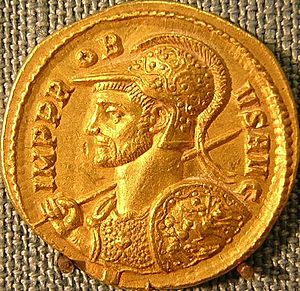Probus (emperor) facts for kids
Quick facts for kids Probus |
|||||||||
|---|---|---|---|---|---|---|---|---|---|
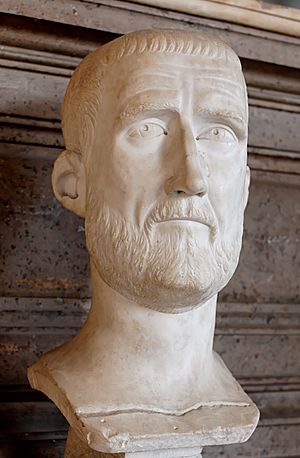
Over-life-sized marble bust in the Capitoline Museums, Rome
|
|||||||||
| Roman emperor | |||||||||
| Reign | c. June 276 – September 282 | ||||||||
| Predecessor | Tacitus and Florian | ||||||||
| Successor | Carus | ||||||||
| Born | between 230 and 235 Sirmium, Pannonia Inferior |
||||||||
| Died | September 282 (aged 50) Sirmium |
||||||||
| Issue | Had descendants | ||||||||
|
|||||||||
| Father | Dalmatius | ||||||||
Marcus Aurelius Probus (/ˈproʊbəs/) was a Roman emperor who ruled from 276 to 282 AD. He was a very active and successful general. Probus was also a careful ruler. During his six years as emperor, he brought peace and wealth to the inner Roman provinces. He also defended the empire's borders from many attacks by barbarian tribes.
After pushing back foreign enemies, Probus had to deal with several rebellions inside the empire. He was known for being fair and forgiving to those he defeated. During his rule, he always respected the power of the Roman Senate. Even after leading his army to victory, he said he depended on the Senate's approval.
After defeating the Germanic tribes, Probus rebuilt old walls. These walls were first built by Emperor Hadrian between the Rhine and Danube rivers. This helped protect a region called the Agri Decumates. Probus also made the defeated tribes send people to help. These new people settled in areas that had lost many residents. They also helped defend the borders. Even though he was popular, Probus was killed by his own soldiers. This happened while he was getting ready for a war against the Persians. His successor, Carus, would lead that war.
Contents
Early Life and Military Beginnings
Probus was born in Sirmium (today called Sremska Mitrovica). This city was in a Roman province called Pannonia Inferior. He was born sometime between 230 and 235 AD. His father's name was Dalmatius.
Probus joined the Roman army when he was about 25 years old. He quickly moved up in rank. He earned many high military awards. Emperor Valerian made him a military tribune when Probus was very young. This was because Valerian saw his great talent. Probus proved himself by winning an important battle against the Sarmatians. This battle took place on the border of Illyria.
During a difficult time for the empire, Illyria was one of the few places that barbarians could not invade. This was thanks to generals like Claudius, Aurelian, and Probus. Other parts of the empire were being overrun by different tribes. Probus became one of Emperor Aurelian's top commanders. He helped Aurelian take back Egypt from Queen Zenobia in 273 AD. When Emperor Tacitus became ruler in 275, he made Probus the supreme commander of the East. He gave Probus special powers to protect that dangerous border. Probus fought successfully on almost every border of the empire. After Tacitus died in 276, Probus was chosen as emperor by his troops in Asia Minor.
Probus as Emperor
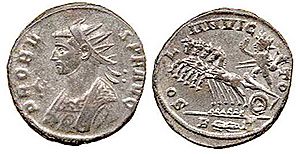
After Tacitus died, his half-brother Florian also declared himself emperor. Florian took control of Tacitus's army in Asia Minor. But Florian was killed by his own soldiers. This happened after a difficult fight against Probus in the mountains of Cilicia. Unlike Florian, Probus respected the Roman Senate. He sent a message to Rome asking them to approve his claim to the throne. The Senate gladly agreed.
Probus then traveled west. In 277, he defeated the Goths along the lower Danube River. Because of this victory, he earned the title Gothicus. The Goths respected his skills and asked for a peace treaty with the empire.
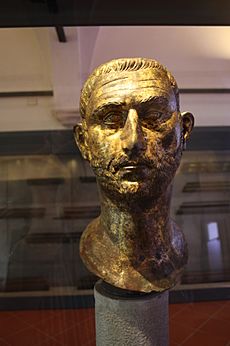
In 278, Probus led successful campaigns in Gaul. He fought against the Alemanni and Longiones tribes. These tribes had crossed the Rhine River into Roman lands. At the same time, his generals defeated the Franks. These battles helped clear Gaul of Germanic invaders like the Franks and Burgundians. This allowed Probus to take the titles Gothicus Maximus and Germanicus Maximus. It is said that 400,000 barbarians were killed during Probus's campaigns. The entire nation of the Lugii was wiped out.
After defeating the Germanic invaders in Gaul, Probus crossed the Rhine River. He fought successfully against the barbarians in their own lands. He forced them to pay tribute to Rome. After these campaigns, Probus repaired the old fortifications. These walls were built by Emperor Hadrian in a vulnerable area between the Rhine and Danube rivers. This area was in the region of Swabia.
More importantly, Probus made the defeated tribes send people to Rome. This set a new example of settling barbarians within the empire. These people served as helpers in the army on a large scale. Many Roman provinces had lost people due to war, disease, and heavy taxes. The new barbarian settlements helped to restore defenses along the borders. They also helped with farming.
Probus continued to improve the army's discipline. He was also less cruel than some previous emperors. One of his main rules was never to let soldiers be idle. In times of peace, he made them work on useful projects. For example, they planted vineyards in Gaul, Pannonia, and other areas. This helped to rebuild the economies in these damaged lands.
Between 279 and 280, Probus was in Raetia, Illyricum, and Lycia. There, he fought against the Vandals. In the same years, Probus's generals defeated the Blemmyes in Egypt. Either then or during his earlier time in Egypt, he ordered bridges and canals to be rebuilt along the Nile River. The Nile region was important for producing grain for the entire Roman Empire.
From 280 to 281, Probus put down three people who tried to take his place as emperor. These were Julius Saturninus, Proculus, and Bonosus. We don't know exactly how big these rebellions were. But there are signs that they were not just small local problems. After this, Probus also stopped a rebellion in Britain. He had help from a man named Victorinus, who later became a consul in 282. During the winter of 281, Probus was in Rome. He celebrated a triumph, which was a big parade to celebrate his victories.
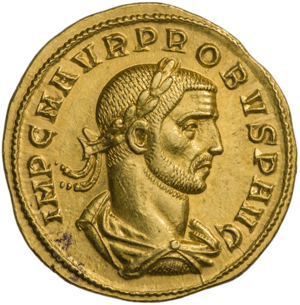
Probus was eager to start his campaign in the East. This campaign had been delayed by the rebellions in the West. He left Rome in 282. He first traveled to Sirmium, his hometown.
Assassination
There are different stories about how Probus died. One story says that the commander of the Praetorian Guard, Marcus Aurelius Carus, was unwillingly declared emperor by his troops.
Probus sent some troops to fight Carus. But those troops switched sides and supported Carus. Probus's remaining soldiers then killed him in Sirmium in September or October 282. Other sources say that Probus was killed by unhappy soldiers. They rebelled against his orders to work on public projects, like draining swamps. It is said that the soldiers were angry when they heard him complain about needing a large standing army. Carus was declared emperor after Probus's death. He then punished those who killed Probus.
Probus's Legacy
Historians like Edward Gibbon believed Probus was the last of Rome's good and fair emperors. Probus's successor, Carus, did not bother to ask the Senate to confirm his title. Then, Diocletian (who ruled after Carus) actively worked to reduce the Senate's power. Diocletian made the emperor's power absolute and divine. After Diocletian's changes, the Roman Senate never again played a big role in running the empire.
In terms of military success, Probus's victories continued a line of strong military emperors from Illyria. This line began with Claudius Gothicus. These emperors helped Rome regain its military strength after the difficult period known as the Crisis of the Third Century.
Family Tree
| previous Aurelian Roman Emperor 270–275 ∞ Ulpia Severina |
Tacitus Roman Emperor 275–276 |
Florian Roman Emperor 276 |
Probus Roman Emperor 276–282 |
Carus Roman Emperor 282–283 |
next Diocletian Roman Emperor 284–305 ∞ Prisca |
||||||||||||||||||||||||||||||||||||||||
| Carinus Roman Emperor 282–284 |
Galeria Valeria | ||||||||||||||||||||||||||||||||||||||||||||
See also
 In Spanish: Probo para niños
In Spanish: Probo para niños
 | Tommie Smith |
 | Simone Manuel |
 | Shani Davis |
 | Simone Biles |
 | Alice Coachman |


